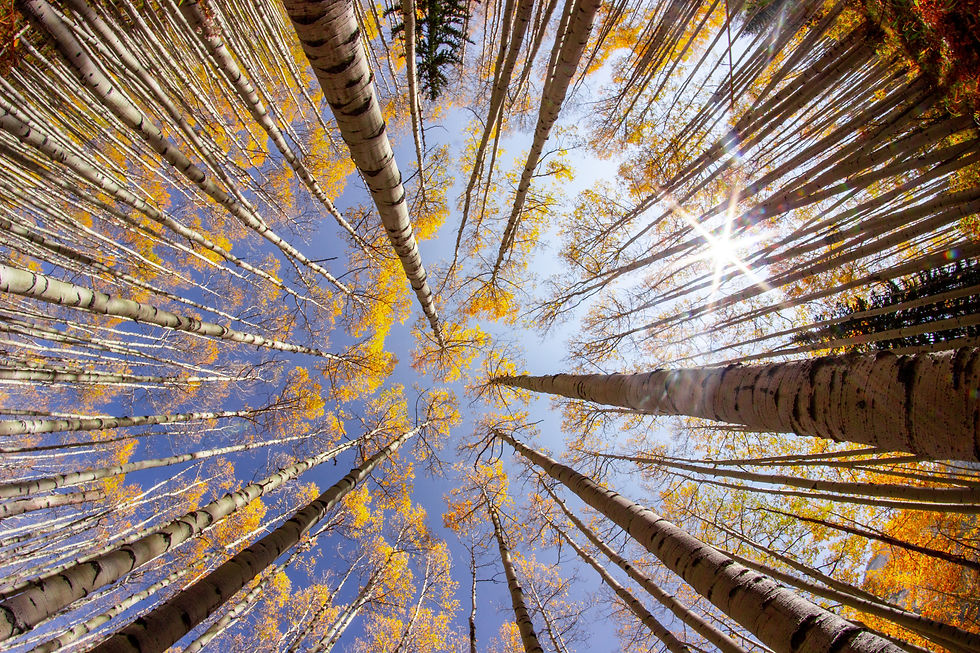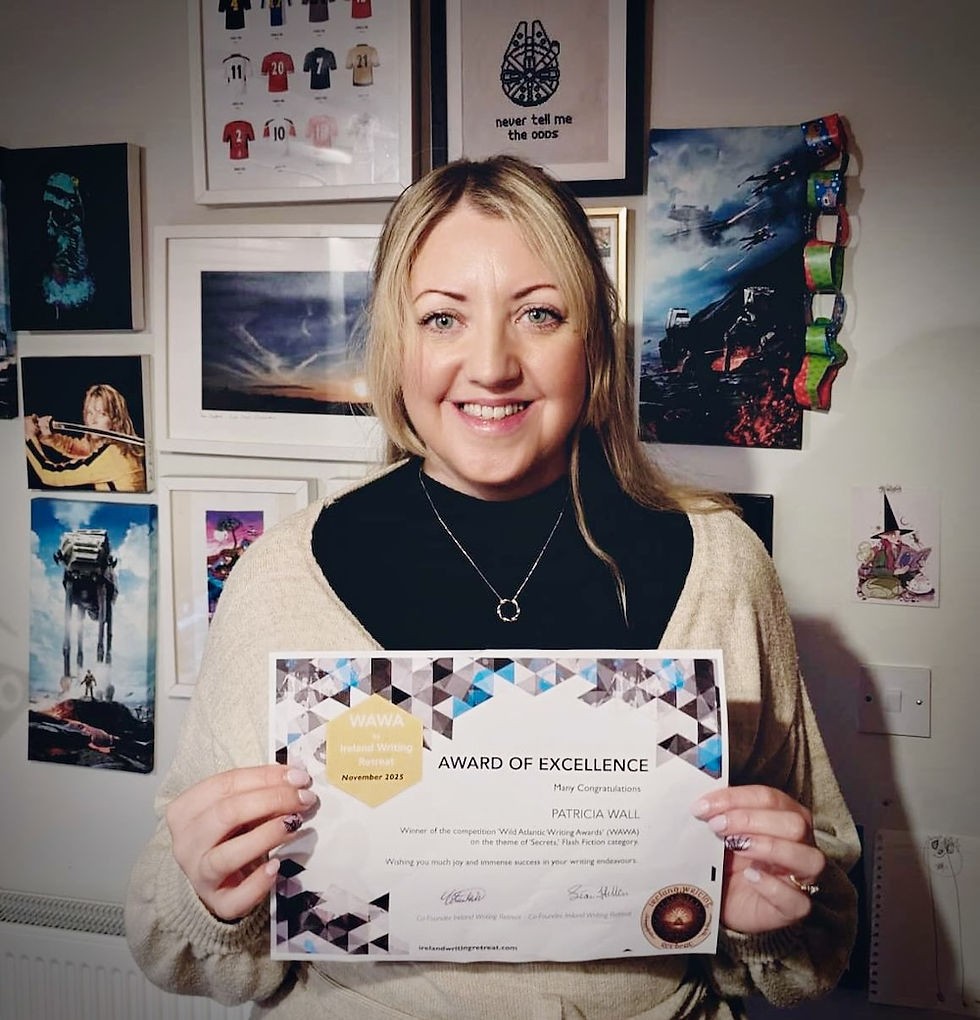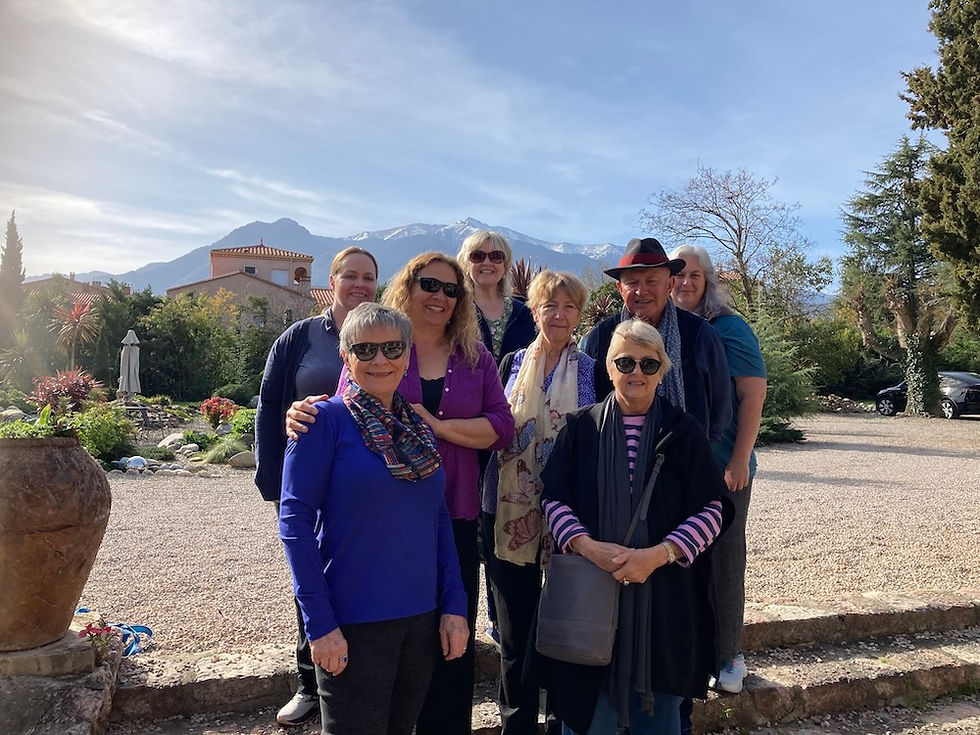Stories, Awards And A Chance You Might Not Want to Miss
- columbiahillen

- Mar 2, 2021
- 5 min read
Updated: Mar 5, 2021

Honoring the finalists in our last ‘Wild Atlantic Writing Awards’ (WAWA), we are delighted to publish stories that qualified in the Top Ten, with a flash fiction and creative nonfiction entry below.
We also take this opportunity to remind you that deadline is approaching for our third edition of WAWA, which we’re endearingly calling, ‘the Love Competition.’
With 1,000 euro prize money at stake, we ask you to write no more than 500 words on the multi-faceted theme of Love - of person, place or pet. Or simply whatever images the word ignites in your own imagination.
Entries are welcome in two categories: creative nonfiction and flash fiction.
And remember, you still have the chance to refine your writing skills by participating in our bespoke Virtual Writing Retreat, which kicks-off this weekend, with a flash fiction workshop.
As personal critiques of participants’ existing and in-class work are involved, the maximum number of people accepted for each weekend is 10.
Weekend One focuses on flash fiction and the importance of questions.
Weekend Two focuses on how to overcome the challenges of memoir writing.
Seafood
by Hannah Edgerly

“How would the tentacles feel?”
“What? Where would they be going?”
My lover and I were lying on a blanket in the grass. We had hiked to this clearing and as no-one was around, we stripped naked. Venturing into the nearby stream, we cooled down on this hot day. We lay entangled in each other’s limbs. I marvelled at the taut muscles and smooth lines of my lover’s body, this man who was twenty years younger than me. I was 46, my body starting to bulge where it shouldn’t and shrink where I wished it would bulge.
I was writing a sci-fi story about interspecies love and one of the characters had tentacles. My lover was kissing my neck, but I was distracted. “The tentacles would go to all of the usual places,” I said. He laughed.
“There are no usual places when it comes to tentacles.”
“Right, except in some Japanese porn.”
“Live action porn? Do they hire squid?”
“No, just animated stuff.”
My lover reached over to kiss me, and I forgot about tentacles for a minute or two. His hands moved to caress my breast where his fingers spread out. Bam! The thought about tentacles came back.
“What about the suckers?”
My lover and I drew back at the same time.
“What?” he asked.
“Sorry. I was just wondering if the suckers on the tentacles worked together or separately.”
“Maybe you would need to consult an expert on cephalopods.”
“You’re right. I need to talk to someone.”
He started to kiss me again and I tried to focus just on the kiss. As his tongue explored my mouth I began to feel a tentacle with suckers probing my insides. I jerked back.
“What now?”
“Just a nasty visualization of a tentacle.”
“Tentacles might not be all bad.”
“Really? They seem so foreign.”
We started to kiss again, tongues intertwined, when I felt something different wrap around me. My eyes flew open as suckers attached to my back. I cried out, but the sound was muffled because my lover’s tongue had grown. Tentacles were coming out of my lover’s torso. I moved back and gasped. My lover looked at me calmly and said, “Is this good for you?”
“Who? What are you?”
“I’m Squid Man of the Zyrbec galaxy, and I travel the universe for, well, fun. Does my true form bother you?” he asked.
He looked at me with big squid eyes and said, “If you need to adjust, I can revert to my human form.”
“That might be best.” A nagging thought rose to the surface. “Is it even legal for me to make love to you since you are a different species?”
“It’s legal on my planet where interspecies relationships are common.”
“Really? Maybe I can adapt to your squid-like form one tentacle at a time.”
“You mean like this?”
That, my friends, is how my own interspecies love affair started.

Hannah Edgerly, who lives in Providence, Rhode Island, likes chocolate, vampires and cats. Having graduated from Brown University, Hannah enjoys her role as an artists’ model at Rhode Island School of Design and working at Stockbridge Booksellers. Her virtual writing colleagues and Dungeons & Dragons group have helped keep her sane during the pandemic. As to her feelings about the ‘Wild Atlantic Writing Awards,’ she says, “I felt excited and nervous about submitting my story and ecstatic, like hugging a squid, about being a finalist.”
Akin
by Georgia Park

I grew up among trembling Aspens. Their pale limbs stretched skyward, leaves shaking anxiously beneath the slightest of breezes. I would wrap my own fragile limbs around their thin bodies - a sensitive kinship of sorts.
The leaves change to a vibrant gold in the cool of late September, slanting rays of afternoon sunlight turning the forest into a sea of yellow, set against a pale cerulean sky. I loved the Earth most then, in that moment before an inevitable undoing. It only ever took a single windstorm to strip the Aspens bare, an eerie sight of delicate branches, still reaching for something unknown. The fallen leaves dried up into ghosts of themselves, the air ripe with the smell of decay. I still loved them then - their fragile crunch beneath booted feet. Fertilizer for the earth, nourishing the native flora.
I too went through these inevitable cycles. Some months were for blossoming - writing incessantly, recognizing so clearly the beauty around me, my mind like an antenna, tuning in to hopeful frequencies. Some months brought a form of undoing, a loss of vitality. Intention and inspiration like crumbling ghosts underfoot. The longest season was always that of quiet contemplation. The months of turning inward; of gathering the final stores of my energy and holding it deep within. Reserves of vibrancy stretched thin. Pale arms outstretched towards a powder blue sky, reaching for something unknown.
Like the Aspens, it has never taken much to shake me. Like the Aspens, I know how to withstand desolate stretches of time. I have grown roots that anchor me - less in one place, more to the grounding depth of existence. Like the Aspens, I understand that loss is inevitable. That there is beauty in ageing, in the cyclical nature of things. That there is grace in the act of letting go.
With the slow return of Spring comes the emergence of fuzzy catkins, hanging like caterpillars from pale branches. This is a gentle reminder that growth is not always beautiful. Once they fall, littering the ground like a swarm of strange insects, the bright green leaves begin breaking out of their small buds. An emergence of hope.
I live now along windy coastlines, the trees enormous and unyielding. The landscape is shaped by the violence of coastal winters, the damp air encouraging growth of velvet moss on coarse limbs. Evergreens stand tall along eroding cliff-sides, against raging windstorms. Sometimes branches are lost, sometimes their thick trunks appear tattered and windblown, but still they stand. I know people who were shaped like this. I recognize the steely resolve, the brilliant adaptability. I take notes from these giants, they have so much to teach.
But scattered throughout the boreal forest, it’s the thin, quaking poplars that I feel most akin to. The dark notches against pale bark, the sensitive leaves. My knobby, ever-bruised knees. My delicate nerves, forever shaking. Reaching always skyward. Trusting the seasons. Trusting the roots that anchor.

Georgia Park lives on the west coast of Canada with her partner and, as she says tongue-in-cheek, “too many houseplants.” Aside from an obvious love of Nature, Georgia is passionate about writing and describes entering our ‘Wild Atlantic Writing Awards’ as “a wonderful challenge” and being placed in the Top Ten as “very exciting.”










Comments